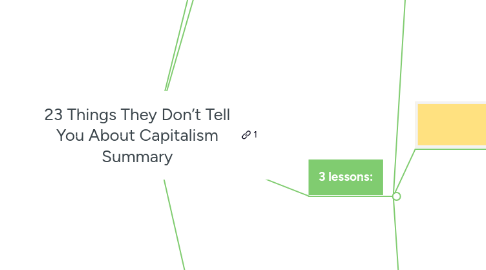
1. 1-Sentence-Summary:
1.1. 23 Things They Don’t Tell You About Capitalism will help you think more clearly about our current economic state by uncovering the hidden consequences of free-market capitalism and offering solutions that could give us all a more fair world.
2. Favorite quote from the author:
2.1. "Markets weed out inefficient practices, but only when no one has sufficient power to manipulate them." - Ha-Joon Chang
3. 3 lessons:
3.1. Your financial choices aren’t rational and businesses take advantage of that, but governmental economic planning can help fix that.
3.1.1. In the late 90s, two economists named Robert Merton and Myron Scholes received the Nobel Prize for their work.
3.1.1.1. Centering around the idea that people always make rational financial choices, they began applying their theories in the real world. Rather than making it big, however, these two ended up broke.
3.1.2. While we want to think we act rationally when it comes to finances, the truth is most of us cannot.
3.1.3. The fatal flaw in their ideas is similar and foundational to many of the assumptions of free-market economics.
3.1.4. In reality, making completely rational choices requires having every possible detail and taking it into account.
3.1.4.1. Our best actions come when we look at all scenarios and alternative routes.
3.1.5. Unfortunately, there’s no way that any of us can get that kind of vast information for every money decision we have to make.
3.1.5.1. Thus, our choices aren’t rational but instead are limited to bounded rationality (more on that below)
3.1.6. If the government were to step in and limit economic choices, we could make better selections.
3.1.6.1. Given only options we can understand, our ability to thrive economically would improve. It’s not such a wild idea to do this, either. The government already limits drugs and unsafe cars to help keep us safe.
3.2. Despite fears of governmental economic planning, implementing it the right way can be wildly beneficial.
3.2.1. While a free-market economist might tell you the government shouldn't interfere with the economy, they’d likely cite the failure of this pattern in the Soviet Bloc.
3.2.1.1. You might hear that because it failed there, it will fail everywhere else, too. But that’s not the case.
3.2.2. A government can do a great job of guiding the economy if given the right amount of control.
3.2.2.1. The problem in the Soviet Bloc was that they had too much authority.
3.2.2.2. A little guidance from the state, who often knows more about the whole economy than individual companies, can go a long way.
3.2.3. An example:
3.2.4. In the United States, the government has already guided the market in the past. If it weren’t for their helping hand, aircraft, biotech, and internet industries might not be as successful.
3.3. Capitalism isn’t such a bad thing, it’s how we apply it to our world that causes problems.
3.3.1. Capitalism certainly has its benefits.
3.3.1.1. The profit motive, or people’s desire to make money, drives people to innovate and create new inventions that make society better.
3.3.1.2. Additionally, capitalism helps regulate the economy by making sure we have enough plumbers and not too many rock stars.
3.3.2. Think of capitalism like a car.
3.3.2.1. Without seat belts or brakes, the vehicle is likely to crash, causing damage and injury.
3.3.2.2. But given proper safety standards, cars provide many opportunities otherwise unavailable to the owner.
3.3.3. The same is true of economics.
3.3.3.1. If we let the market run rampant, like free-market capitalism does, it could be dangerous.
3.3.3.2. With some small amount of governmental control, however, we get the opportunity for a safer, fairer, and better system.
3.3.4. Bounded rationality says that humans are better at making decisions when options are limited.
3.3.5. With a little more power, our politicians could help us have a better economic system.
3.3.5.1. For example, leaders could guide banks to not make risky investment choices.
3.3.5.2. Improving our system in these small ways could provide big opportunities for making our world a better place.
